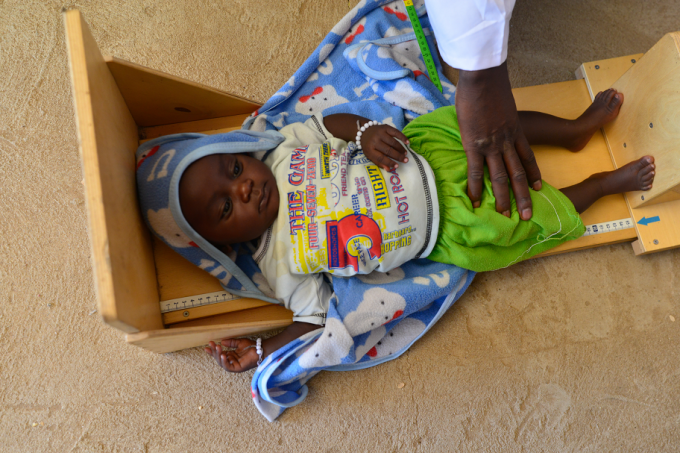Young boy calmly laying in the scale while he is being measured at ECHO supported health and nutrition facility_Kalamindo
Khartoum, July 4th
1.1 million children in Sudan are going hungry, as the country faces its worst food crisis in recent years.
[i] The number of children who are living through emergency levels of food insecurity has doubled since 2019, with half a million more children at risk of suffering the severe consequences of extreme hunger compared to the same time last year.
[ii]
A combination of spiralling food prices, inflation, and job losses due to the impact of COVID-19 is having a devastating impact on Sudanese families. In total, an estimated 9.6 million people do not know where their next meal is coming from.
The lockdown measures designed to prevent the spread of COVID-19 have disrupted markets and cross-border trading, crippling livelihoods and pushing-up prices. As of June 2020, cereal prices tripled compared to last year and are around four times higher than the last five-year average.
[iii]
Save the Children staff say even the most basic food items are out of reach. Arshad Malik, Save the Children’s Country Director in Sudan, said:
“Our teams on the ground heard from families that they had to break their fast with water during Ramadan – as there was simply no food.
“Even before this pandemic, families were reeling from the effects of decades of conflict, underdevelopment and a weak economy. Now, their lives have become even harder. Our team is meeting more and more parents every day who are struggling to put food on the table for their children.
“120 children are dying every day due to malnutrition and related causes.[iv] There is an urgent need to support family with money and food during the COVID-19 response, including providing emergency cash and supplies.” Continued Malik.
Save the Children is working to reach the most vulnerable displaced people and host communities in Kordofan, Darfur and Khartoum. During the COVID-19 crisis, Save the Children has provided cash grants to 2,000 refugee families in Khartoum, and continued distributing seeds and farming equipment in South Kordofan and vouchers in Darfur and Kordofan. Save the Children is also supporting more than 100 nutrition centres in Darfur, Kordofan, Red Sea and Blue Nile States to reduce malnutrition amongst children and pregnant or breastfeeding mothers.
Spokespeople are available. To arrange an interview please contact:
[i]An estimated 21% of the population are experiencing Crisis or worse levels of food insecurity (IPC Phase 3 or above) and are in need of urgent action. This is the highest figure ever recorded in the history of IPC in Sudan compared to previous years. See IPC
[ii]There are currently 1.1 million children in ‘IPC level 4’, the food security stage before famine (see IPC for more info). This time last year, there were 521,000 children in the same category. This is calculated on the basis that children make up 50% of the population, see UNICEF.

 Sudan
Sudan